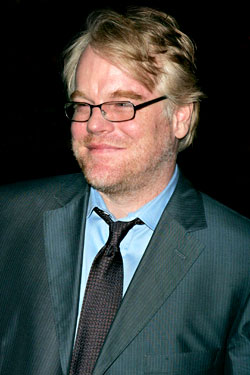
Two summers ago, on the opening night of Mother Courage and Her Children with Meryl Streep, Philip Seymour Hoffman shambled into the outdoor Delacorte Theater audience alone, uncombed, unshaved, in a faded black T-shirt, glancing neither left nor right. The major critics were there, along with other well-known actors, but Hoffman looked as if he’d just woken up from a nap on a nearby bench. At intermission, he plunged into the darkness of Central Park; I found him smoking and pacing, head down, under a tree. Normally, I don’t bug celebrities, but I’d had lunch with him for a profile, before he’d won the Oscar for Capote, and I thought, Well, maybe this once. “Oh, yeah, yeah,” he said, shaking my hand but unsmiling, neither welcoming nor hostile. “Congratulations on the Academy Award.” “Yeah … yeah … it’s great.” “Things going well?” “Yeah, great, really great.” “You acting in anything now?” “Yeah, yeah, I got a few things … yeah.” Sparkling repartee. Hoffman has a defensive grogginess that’s difficult to penetrate—and it didn’t seem the time to try. I left him under his tree.
Now—as in the other day, on the phone—he tells me he was too antsy to talk that night because he was waiting to hear about several roles, among them the lead in Charlie Kaufman’s directorial debut, Synecdoche, New York, which he got. What’s it about? “I’m not dodging the question,” he says, “but it’s about a man’s life.” “Ah.” “No, really, a man’s life, from about 40 until, well, it’s unspecified. Until he dies. He’s a theater director. If you want to know what it’s about, I would say, a life.” Charlie Kaufman meets Tolstoy: a tantalizing prospect.
We’ve come to expect at least one startling Hoffman performance per year, but he raised the bar this fall with three, in The Savages, Before the Devil Knows You’re Dead, and Charlie Wilson’s War (out December 21). In the first, he’s an emotionally arrested drama professor who’s thrust into close contact with his high-strung sister (Laura Linney) when they have to care for their estranged, semi-demented father (Philip Bosco). It’s a performance without tics or gimmicks, and he’s loose and in the moment—his warmth sneaks out. “He’s probably one of the characters closer to me than most,” says Hoffman.
“He’s not grotesque,” I offer.
“Well, everyone’s life is grotesque if you look close enough. I don’t shy away from that side.”
“No, you go in the other direction.”
“Right.”
Take that sex scene that opens Before the Devil Knows You’re Dead, in which he rides Marisa Tomei pretty hard and lets his flesh flop around. “I wanted that scene to look like what it was. It wasn’t about love, it was a fantasy. And Sidney Lumet agreed.”
When I’d interviewed Hoffman a few years ago, he told me he worries about his weight, which he gains extremely easily. But his vanity is a kind of anti-vanity, his slobbiness a declaration of integrity. He relished playing a character in Charlie Wilson’s War described as the opposite of James Bond—a Cold War CIA operative who lives to kill Commies and pointedly refuses to suck up. That’s his comfort zone, and he steals every scene.
The day after we talk, he starts shooting John Patrick Shanley’s Doubt, opposite Streep. It’s in New York, where he has lived since NYU, where he directs and acts in plays and walks around looking like a slob. And he loves it as much as it loves him. “Anything I’ve built,” he says, “has everything to do with this city.”
